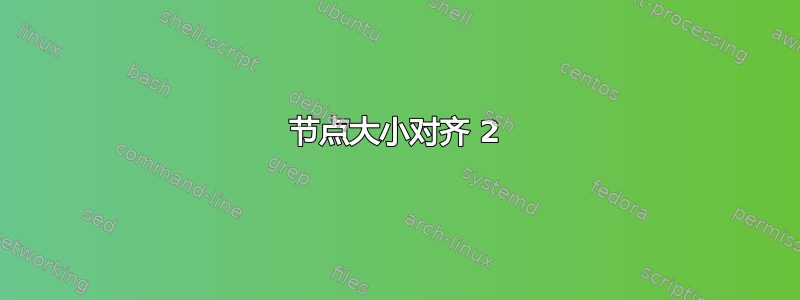
再次帮助:我无法使 TST 箭头与下面的 3 个块大小相同。
我希望 TST 箭头的大小与 Nov、Dev、Jan 这三个块的大小完全相同。
\documentclass[12pt]{article}
\usepackage[utf8]{inputenc}
\usepackage[T1]{fontenc}
\usepackage{lmodern}
\usepackage[frenchb]{babel}
\usepackage{tikz}
\usetikzlibrary{chains,scopes,positioning,backgrounds,shapes,fit,shadows,
calc}
\usepackage[paper=a3paper, landscape=true,margin={1cm,2cm},
headsep=5mm,headheight=2cm]{geometry}
\begin{document}
\noindent
\begin{tikzpicture}[background rectangle/.style={draw=blue!50,fill=blue!10,
rounded corners=5pt, drop shadow},
show background rectangle]
\tikzset
{
arrow/.style=
{
draw,
minimum height=10mm,
minimum width=20mm,
inner sep=0pt,
shape=signal,
signal from=west,
signal to=east,
signal pointer angle=110,
top color=green!60!black!90!,
bottom color=green!30,
% fill=blue!50,
drop shadow,
},
sign/.style={
draw,
minimum height=10mm,
minimum width=20mm,
inner sep=0pt,
shape=signal,
signal to=east,
signal pointer angle=110,
% fill=blue!50,
top color=green!60!black!90!,
bottom color=green!30,
drop shadow,
},
}
\begin{scope}[start chain=going right,node distance=1mm]
\node[name=sept3, sign,on chain, minimum width=30mm, anchor=west] {Sept.};
\foreach \mois / \Smois in
{
oct3/Oct., nov3/Nov., dec3/Déc.,
jan3/jan., fev3/fév., mar3/Mars
} \node[name=\mois, arrow, minimum width=30mm,on chain, font=\small] {\Smois};
\draw let \p1=($(oct3.east)-(sept3.west)$), \n2={veclen(\x1,\y1)} in
node[sign, name=ideation, above=(0mm of sept3.north west),
anchor=south west,
font=\small, minimum width=\n2-\pgflinewidth, top color=brown!30!black!90,
bottom color=brown!30,] {Idéation};
\draw let \p1=($(oct3.east)-(fev3.west)$), \n2={veclen(\x1,\y1)} in
node[arrow, name=tst1, right=(1mm of ideation.east),
anchor=west,
font=\small, minimum width=\n2-\pgflinewidth, top color=orange!30!black!90,
bottom color=orange!30,] {TST};
\end{scope}
\draw (0,-1) grid (20,2);
\end{tikzpicture}
\end{document}
答案1
这就是你要找的吗?
您的问题是定义minimum width第二个“信号”是什么。这有点棘手……但是,以下代码有效:
\documentclass[12pt]{article}
\usepackage[utf8]{inputenc}
\usepackage[T1]{fontenc}
\usepackage{lmodern}
\usepackage[frenchb]{babel}
\usepackage{tikz}
\usetikzlibrary{backgrounds,calc,chains,fit,positioning,shapes,shadows,scopes}
\usepackage[paper=a3paper, landscape=true,margin={1cm,2cm},
headsep=5mm, headheight=2cm]{geometry}
\begin{document}
\noindent
\begin{tikzpicture}[
background rectangle/.style = {draw=blue!50,fill=blue!10,
rounded corners=5pt, drop shadow},
show background rectangle,
%
sign/.style = {%
shape=signal,
draw,
minimum height=10mm,
minimum width=30mm,
inner sep=0pt,
font=\small,
signal from=west,
signal to=east,
signal pointer angle=110,
anchor=west,
top color=#1!60!black!90!,
bottom color=#1!30,
drop shadow,
on chain
},
start chain = going right,
node distance = 0mm and 1mm
]
\node (sep3) [sign=green,signal from=nowhere] {Sept.};
\foreach \mois / \Smois in {
oct3/Oct., nov3/Nov., dec3/Déc.,
jan3/jan., fev3/fév., mar3/Mars
}
\node (\mois) [sign=green] {\Smois};
%
\draw let \p1 = ($(oct3.east)-(sep3.west)$),
\n1 = {veclen(\x1,\y1)} in
node (ideation) [sign=brown,signal from=nowhere,
above right=0mm of sep3.north west,
minimum width=\n1-\pgflinewidth] {Idéation};
%
\draw let \p1 = ($(jan3.east)-(nov3.north west |- nov3.west)$),%<-- here is the trick
\n1 = {veclen(\x1,\y1)} in
node (tst1) [sign=orange,
right=of ideation,
minimum width=\n1-\pgflinewidth] {TST};
\draw (0,-1) grid (20,2);
\end{tikzpicture}
\end{document}
在上面的代码中,我随意地使其更简洁。为此,我引入了颜色选项,然后将“箭头”和“sig”样式合并为一个通用样式,并使用参数signal from=nowhere在本地区分它们。此外,我省略了scope,因为没有任何用途。




